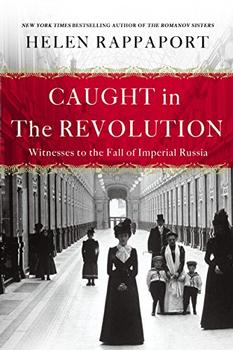Page 4 of 4
There are currently 25 reader reviews for Caught in the Revolution
Write your own review!
Katherine P. (Post Mills, VT)
Exhaustive and Exhausting
A long book that was as chaotic and confusing as the events it portrayed. Difficult to read because of excessive repetition of place names and numbers of people marching, shouting, killing, looting, starving, raving, randomly shooting and then seemingly returning to " normal " before starting all over again. The narrative is interspersed with quotes from various observers of the actions during the February 1917 uprising followed by observations during the finality of the October revolt. Most of the observations are either by Red leaning foreign correspondents and photographers sent by their publications to report on the events, or by people on a mission to " help " one faction or another such as Mrs Pankhurst come to organize the Russian women who have now achieved freedom. There are also letters between diplomats and their governments or letters to family back home.
So many questions--where are the young girls displaced from the elegant Smolny Institute? Were they murdered --were their bodies among the many described as fallen on the street or in the hallways of various palaces? How is it that the streets are swollen with soldiers who left the front ( there is after all a war going on) yet other trains are headed to the front with soldiers? Where are the trucks laden with food and arms coming from and where did the food go if people are lined up in the streets listlessly waiting for food at the shops? How does one determine that there are thousands marching in the streets and not hundreds? With all the shooting and so many loose canons among these throngs how is it that in one instance there are only seven killed, in another only eleven?
One thing for certain--there was chaos and anarchy. The only ones doing any successful planning were the Bolsheviks, even with struggles for power within the ranks. The resentment against money was great and reminds me of the present day criticism of the 1 in general and the Koch Brothers in particular. Also similar, demands for higher wages and less work--increases to three and four times their wages and reduction to a four hour work day was not sufficient to satisfy these revolutionaries. Murder, rape, looting were all on the rise--rape on college campuses, ambush of policemen sitting in patrol cars, looting and riots in the streets--all very familiar.
But, one must wonder, is the result of the Russian Revolution--suppression of speech and religion, total central government control --to be the result here, too? And if that comes, will it happen in the span of less than a year? 2017 is the publication date of this book, to mark the centennial of that Revolution--will it mark, with a new President, no matter which, the beginning of ours?
